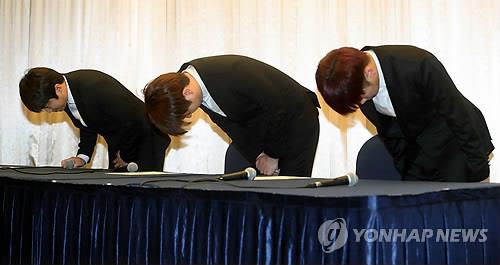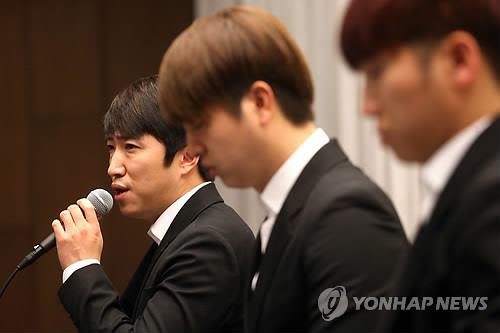- California Assembly OKs highest minimum wage in nation
- S. Korea unveils first graphic cigarette warnings
- US joins with South Korea, Japan in bid to deter North Korea
- LPGA golfer Chun In-gee finally back in action
- S. Korea won’t be top seed in final World Cup qualification round
- US men’s soccer misses 2nd straight Olympics
- US back on track in qualifying with 4-0 win over Guatemala
- High-intensity workout injuries spawn cottage industry
- CDC expands range of Zika mosquitoes into parts of Northeast
- Who knew? ‘The Walking Dead’ is helping families connect
Three S. Korean comedians apologize for sexist podcast remarks
Three prominent South Korean comedians, collectively known as Ongdalsem and recently under fire for crass comments on their podcast, gathered for a public apology Tuesday, Yonhap reported.
The trio comprises Jang Dong-min, Yoo Se-yoon and Yoo Sang-moo. Each are familiar faces to TV viewers in the country.
“We sincerely apologize to the people we’ve hurt, as well as their families, and will work for the rest of our lives to make sure this doesn’t happen again,” Ongdalsem said.
Earlier this month, a past Ongdalsem podcast went viral among Korean netizens after it was posted online.

Comedians Jang Dong-min, Yoo Sang-mo, Yoo Se-yoon apologize for remarks made during a podcast at a press conference held in Seoul Tuesday. (Yonhap)
They were accused of harsh, sexist remarks that included the comments “Women talk about their previous sexual experiences because they’re stupid,” “whore” and other profane language. The podcast also made a joke of a survivor of the 1995 Sampoong mall collapse, which killed 502 people and is remembered as one of the country’s biggest peacetime disasters.
The survivor pressed charges for defamation against Jang Monday.
Jang issued an apology and said he would comply with all police investigation and any punishment given to him.
Jang, who had been in the midst of competing for a permanent spot in popular variety program “Infinite Challenge,” resigned following public outrage. He has also left a radio program he hosts, KBS’s “Jang Dong-min and Lady Jane’s 2 O’Clock Radio.”
“We only think about laughter as we do broadcast and thus always turn to provocative topics and harsh expressions,” Jang said. “We didn’t think that laughter could hurt anyone. We thought it only had to be funny.”













